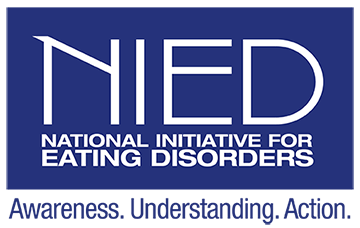Eating Disorders
are serious mental
illnesses associated
with significant
medical complications
that affect every
organ of the body.

Eating Disorders
are not a choice and
affect all genders,
ages, racial and
ethnic identities,
sexual orientations
and socio-economic
backgrounds.
About NIED
NIED is the voice for Canadian families, caregivers, and individuals who are affected by Eating Disorders and other co-morbid and concurrent diagnoses.
We help caregivers, patients, and practitioners fill gaps in care through education and by highlighting better practices in prevention, health promotion, and treatment.
NIED is working with stakeholders across the country to address the gaps in current services, delays in treatment, lack of pan-Canadian data, and insufficient training for clinicians and healthcare professionals.
Supporting People
- NIED provides support and hope for Eating Disorder individuals and families.
- NIED is working with caregivers, healthcare and social services providers to empower and help parents, families, individuals (including in rural and remote locations) to:
- recognize early signs and know how to seek help;
- cope with the situation they find themselves in;
- navigate healthcare and social service systems.
- We know that early detection and intervention can result in full recovery from an Eating Disorder.
Improving Access
- NIED works with a wide range of stakeholders to improve access to appropriate, evidence-based care.
- NIED is working with healthcare and social service providers and statistical agencies to improve Eating Disorders education, reduce wait times, improve access to high-quality care and improve patients’ outcomes.
- We actively collaborate with stakeholders to overcome the following challenges:
- Unfortunately, of the close to 1,000,000 Canadians (Statistics Canada, 2016) who meet the diagnostic criteria for an Eating Disorder, too few have reasonable access to timely, comprehensive and specialized treatment.
- Many people with an Eating Disorder never get diagnosed and suffer significant personal and family distress.
- Eating Disorders have the highest death rate of any mental illness; 1 in 10 will die because of their disorder.
Accomplishments
When NIED was created in 2012, its main objectives were to:
- Promote awareness and education of Eating Disorders to the public;
- Assist persons in coping with the effects of Eating Disorders by offering education and counselling and by establishing mutual support groups;
- Carry out research for the benefit of the public into the lack of programs and funding relating to treatment and awareness of Eating Disorders; and
- Expand the scope and variety of available treatment resources for persons suffering from Eating Disorders.
Since 2012, NIED has:
- Developed and delivered 63 Eating Disorders symposia for the public;
- Interacted with over 10,000 individuals, families and caregivers to provide guidance, support, and education regarding Eating Disorders, the health care system, and social services across Canada;
- Participated in the co-design and development of a CIHR-funded research study aimed at identifying and prioritizing research related to Eating Disorders in Canada; and
- Surveyed, in 2016, approximately 400 organizations to identify gaps in care for people living with and recovering from Eating Disorders in Canada.
In support of these recommendations made by stakeholders across Canada in 2016, as well as caregivers and people with lived experience in 2017 and 2018, NIED has updated its organizational strategy to focus exclusively on working with:
- Caregivers, healthcare professionals, and social services providers to empower and help parents, families, individuals suffering from Eating Disorders;
- A wide range of stakeholders to improve access to appropriate, evidence-based care.
